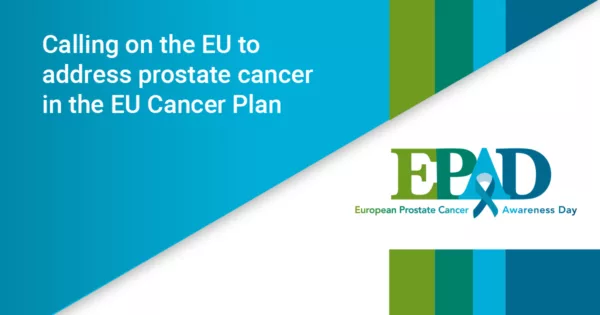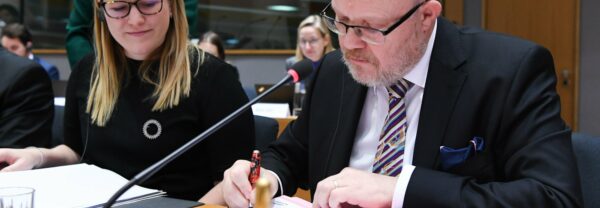EPAD20: A landmark for early detection and awareness raising of prostate cancer
Prostate cancer (PCa) is impacting increasing numbers of men and is the most frequent male cancer in Europe with important consequences for healthcare systems.
Prostate cancer (PCa) is impacting increasing numbers of men and is the most frequent male cancer in Europe with important consequences for healthcare systems. Yet, compared to other common cancers, little is performed at EU level. Nine partners therefore collaborated on the European Prostate Cancer Awareness Day (EPAD20) to call on the EU to address the important issues of early detection and awareness raising of prostate cancer in Europe’s Beating Cancer Plan (EU Cancer Plan), a draft of which is planned for release in December 2020.
EPAD20 is taking place virtually this year on Tuesday, 17 November 2020. The programme (17:30 - 19:00 hours CET) features high-level influencers from various fields: oncology specialists, patient advocates, representatives from charities and foundations, and policymakers, hosted by two leading MEPs: Tiemo Wölken (DE) and Tomislav Sokol (HR). Speakers include Dr. Paolo Guglielmetti (IT), who will give an update on the EU Cancer Plan, Dr. Christine Chomienne (FR), vice-chair of the Mission Board Cancer at the European Commission, and Movember’s Ms. Sarah Coghlan (GB). We spoke with Prof. Hein Van Poppel (BE), EAU Adjunct Secretary General and EPAD20 speaker, too, about the meeting.
Could you tell us about the importance of the European Prostate Cancer Awareness Day?
Prof. Van Poppel: “EPAD was originally an initiative by the European patient coalition Europa Uomo, undertaken by Prof. Louis Denis (BE), Mr. Ken Mastris (GB), and Mr. Erik Briers (BE), to organise an event at the European Parliament to raise awareness of prostate diseases in general. Back then, EPAD stood for ‘European Prostate Awareness Day,’ but by time it was renamed ‘European Prostate Cancer Awareness Day.’ The importance of EPAD20 can be summarised succinctly; even though prostate cancer affects one out of seven men in Western Europe, less than 50% of our male population knows that they have a prostate where a possibly deadly disease like cancer can occur. It is therefore important to organise events that raise the awareness of prostate cancer among policy makers.”
Why did the EAU decide to collaborate on EPAD20?
“Prostate cancer has never received attention at European level; not the attention it deserves, at least. It is the male cancer with the highest incidence. In many countries, it is the second cancer with the highest mortality rate in men, after lung cancer only. In Germany, for instance, prostate cancer is a more frequent cause of death than colorectal cancer.”
“We are currently focusing on early detection of the disease as there is a trend toward an increased incidence of too-late diagnoses of prostate cancer. The cause of this is the anti-PSA-testing propaganda. Since the European Commission has announced its EU Cancer Plan, the EAU thought the time was ripe for prostate cancer to be included in the European fight against cancer more specifically.”
What should the role of the EU be in this objective according to the EAU?
“It is clear that health remains a national responsibility and the EU cannot dictate what should happen in the different member states. However, the European Commission has endorsed European guidelines on screening for breast, cervix, and colorectal cancer; guidelines that were subsequently implemented in the cancer plans of many member states. If the EU is serious about dramatically decreasing the cancer mortality in its member states, it should include clinical guidelines on early detection and diagnosis of prostate cancer in the EU Cancer Plan.”
How can a holistic EU Cancer Plan contribute to improved prostate cancer management in Europe?
“The EU Cancer Plan ‘drivers’ should read and assimilate the EAU White Paper on Prostate Cancer that will be launched at the EPAD20 meeting. The White Paper deals with lifestyle adaptation, early detection and diagnosis, quality of cancer care, multidisciplinary collaboration, patient survivorship, and research and innovation.”
Why should people join the EPAD20 meeting?
“Because it is a great way to focus in on European policy on men’s health issues during ‘Movember,’ the month formerly known as November. Along with hearing from Movember themselves about the success of their awareness raising campaigns, we have a fantastic line-up for the meeting: besides [the names already mentioned earlier in this article], we have Mr. André Deschamps (BE) from Europa Uomo giving the patient perspective, two leading scientific experts in the persons of Prof. Monique Roobol (NL) and Prof. Jelle Barentsz (NL), and a COCIR member talking about the role of the industry in supporting early detection of prostate cancer.”
“I will use my time to present an evidence-based algorithm we have produced for what will be a potential way forward for risk-stratified early detection of prostate cancer in well-informed men, which will allow for a personalised approach on how to proceed after the outcome of a PSA test. The argument against PSA screening is that it would expose men to overdiagnosis and overtreatment. Applying this algorithm will prevent exactly that. It will be proposed at EPAD20 as we aim to bring this information to the lay people, to the patients, to the general practitioners, and all healthcare providers that are confronted with prostate cancer.”
Please join us to improve prospects of prostate cancer patients. Check out the full programme of EPAD20 and register for free!



